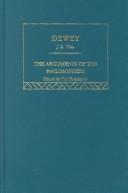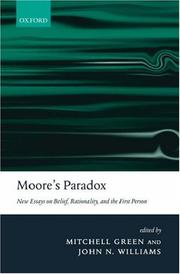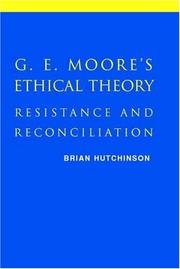| Listing 1 - 10 of 19 | << page >> |
Sort by
|
Book
ISBN: 0716531992 9780716531999 9780716531470 071653147X 9780716531654 0716531658 Year: 2012 Publisher: Dublin Portland, Or Irish Academic Press
Abstract | Keywords | Export | Availability | Bookmark
 Loading...
Loading...Choose an application
- Reference Manager
- EndNote
- RefWorks (Direct export to RefWorks)
With the 2012 success of the film, Albert Nobbs, George Moore has re-entered the public consciousness, and interest in his life and work has expanded beyond the confines of academics and lovers of literature. George Moore was all one would ask for in a man of letters and is a literary giant. An Irish Catholic absentee landlord self-educated within the Parisian cafe culture of the 1870s, Moore was friend to the Impressionists, disciple to Zola, preacher for literary naturalism, self-proclaimed messiah to the Irish revival, and revelatory satirist of those among whom he practiced his vocation
Authors, Irish. --- Irish authors --- Moore, George, --- Rhone,

ISBN: 1136957774 1135002061 1136957782 1282733133 9786612733130 0203849787 9780203849781 9780415203777 0415203775 9780415203920 0415203929 0415203775 0415203929 9781135002060 9781136957789 9781282733138 6612733136 9781136957772 9781136292828 1136292829 0415203708 9780415203708 9781136957734 9780415487832 9781315008790 9781136292897 9781136292965 9780415487702 Year: 1999 Publisher: London New York Routledge
Abstract | Keywords | Export | Availability | Bookmark
 Loading...
Loading...Choose an application
- Reference Manager
- EndNote
- RefWorks (Direct export to RefWorks)
This famous series provides a contemporary assessment and history of the entire course of philosophical thought. Each book constitutes a detailed, critical introduction to the work of a philosopher or school of major influence and significance.
Book
ISBN: 9028415661 Year: 1990 Publisher: Amsterdam Wereldbibliotheek
Abstract | Keywords | Export | Availability | Bookmark
 Loading...
Loading...Choose an application
- Reference Manager
- EndNote
- RefWorks (Direct export to RefWorks)
1 RUSSELL, BERTRAND --- 1 MOORE, GEORGE EDWARD --- Filosofie. Psychologie--RUSSELL, BERTRAND --- Filosofie. Psychologie--MOORE, GEORGE EDWARD --- 1 MOORE, GEORGE EDWARD Filosofie. Psychologie--MOORE, GEORGE EDWARD --- 1 RUSSELL, BERTRAND Filosofie. Psychologie--RUSSELL, BERTRAND --- 1 WITTGENSTEIN, LUDWIG --- Biografie (autobiografie) --- Filosofen --- Roman --- 1 WITTGENSTEIN, LUDWIG Filosofie. Psychologie--WITTGENSTEIN, LUDWIG --- Filosofie. Psychologie--WITTGENSTEIN, LUDWIG --- American literature --- Wittgenstein, Ludwig --- 870 --- proza --- prose
Book
ISBN: 9781107559349 9780521190145 9780511921285 9780511992971 0511992971 9780511989179 0511989172 0521190142 0511994168 1283020785 9786613020789 0511921284 0511991967 0511990960 1107559340 Year: 2011 Publisher: Cambridge Cambridge university press
Abstract | Keywords | Export | Availability | Bookmark
 Loading...
Loading...Choose an application
- Reference Manager
- EndNote
- RefWorks (Direct export to RefWorks)
"G. E. Moore's fame as a philosopher rests on his ethics of love and beauty, which inspired Bloomsbury, and on his 'common sense' certainties, which challenge abstract philosophical theory. Behind these themes lie his critical engagement with Kant's idealist philosophy, which is published here for the first time. These early writings, Moore's fellowship dissertations of 1897 and 1898, show how he initiated his influential break with idealism. In 1897 his main target was Kant's ethics; but by 1898 it was the whole Kantian project of transcendental philosophy that he rejected, and the theory which he developed to replace it gave rise to the new project of philosophy as logical analysis. This edition includes comments by Moore's examiners, Henry Sidgwick, Edward Caird and Bernard Bosanquet, and in a substantial introduction the editors explore the crucial importance of the dissertations to the history of twentieth-century philosophical thought"--
Analysis (Philosophy). --- Moore, G. E. --- Moore, George Edward, --- Mūra, Jī. Ī., --- Arts and Humanities --- Philosophy

ISBN: 1281145556 9786611145552 0191515728 1429469811 9781429469814 9780191515729 9780199282791 019928279X 9781281145550 6611145559 1383042837 Year: 2007 Publisher: Oxford : New York : Clarendon Press ; Oxford University Press,
Abstract | Keywords | Export | Availability | Bookmark
 Loading...
Loading...Choose an application
- Reference Manager
- EndNote
- RefWorks (Direct export to RefWorks)
G.E. Moore observed that to assert, 'I went to the pictures last Tuesday but I don't believe that I did' would be 'absurd'. Such sayings continue to perplex philosophers. This book offers a treatment of the famous paradox and explains its history and relevance.
Moore, G. E. --- Moore, George Edward, --- Mūra, Jī. Ī., --- Absurd (Philosophy) --- Belief and doubt. --- Rationalism.

ISBN: 0521800552 051101824X 9780511018244 9780521800556 9780511498183 0511498187 1280430265 9781280430268 0511047479 9780511047473 1107122465 9781107122468 0521037824 9780521037822 0511174284 9780511174285 0511154046 9780511154041 0511328206 9780511328206 Year: 2001 Publisher: Cambridge [England] New York Cambridge University Press
Abstract | Keywords | Export | Availability | Bookmark
 Loading...
Loading...Choose an application
- Reference Manager
- EndNote
- RefWorks (Direct export to RefWorks)
This 2001 book is a comprehensive study of the ethics of G. E. Moore, the most important English-speaking ethicist of the twentieth century. Moore's ethical project, set out in his seminal text Principia Ethica, is to preserve common moral insight from scepticism and, in effect, persuade his readers to accept the objective character of goodness. Brian Hutchinson explores Moore's arguments in detail and in the process relates the ethical thought to Moore's anti-sceptical epistemology. Moore was, without perhaps fully realizing it, sceptical about the very enterprise of philosophy itself, and in this regard, as Brian Hutchinson reveals, was much closer in his thinking to Wittgenstein than has been previously realized. This book shows Moore's ethical work to be much richer and more sophisticated than his critics have acknowledged.
Ethics, Modern --- Moore, G. E. --- Moore, George Edward, --- Mūra, Jī. Ī., --- Ethics. --- Arts and Humanities --- Philosophy
Book
ISBN: 1282035762 9786612035760 1443804770 1847180299 9781847180292 9781443804776 Year: 2006 Publisher: Newcastle, U.K. : Cambridge Scholars Press,
Abstract | Keywords | Export | Availability | Bookmark
 Loading...
Loading...Choose an application
- Reference Manager
- EndNote
- RefWorks (Direct export to RefWorks)
The Irish writer George Moore (1852-1933) was a very significant and often controversial figure on the literary stages of Paris, London and Dublin at a key cultural moment. Between 1880 and 1931, his creative involvements included spells with literary theatres in London and Dublin, jousts with the daring and repression of the fin de siècle, and a hail-and-farewell to Yeats and the Irish Revival. This collection of essays offers fresh insights into diverse elements of his œuvre and reflects s...
Authors, English --- English authors --- History and criticism. --- Moore, George, --- Rhone, --- Criticism and interpretation --- Ireland --- Irish Free State --- In literature
Book
ISSN: 03448142 ISBN: 9783110371031 9783110366495 9783110392418 3110371030 Year: 2014 Volume: 124 Publisher: Berlin De Gruyter
Abstract | Keywords | Export | Availability | Bookmark
 Loading...
Loading...Choose an application
- Reference Manager
- EndNote
- RefWorks (Direct export to RefWorks)
Representationalism grasps the meaning and grammar of linguistic expressions in terms of reference; that is, as determined by the respective objects, concepts or states of affairs they are supposed to represent, and by the internal structure of the content they articulate. As a consequence, the semantic and grammatical properties of linguistic expressions allegedly reflect the constitution of the objects they refer to. Questions concerning the meaning of particular linguistic expressions are supposed to be answerable by investigating the metaphysics of the corresponding phenomena. Accordingly, questions of the meaning of psychological concepts, are turned into questions of the nature of psychological states. Concerned with Moore‘s Paradox, representationalist approaches lead into an investigation of the state of affairs supposedly described by Moore-paradoxical assertions, and thus eventually into investigations concerning the metaphysics of belief.This book argues that this strategy necessarily yields both a wrong solution to Moore‘s Paradox and an inadequate conception of the meaning of the expression I believe. Turning to the metaphysics of belief is of no use when it comes to understanding either the meaning of the expression 'I believe' or the logic of avowals of belief. Instead, it proposes to focus on the role they play in language, the ways in which they are used in practice.
Philosophy of language --- Theory of knowledge --- Pragmatics --- Moore, George E. --- Representation (Philosophy) --- Moore, G. E. --- Moore, G.E. --- Moore, G. E. - (George Edward), - 1873-1958
Book
ISBN: 063115180X 9780631151807 Year: 1977 Publisher: Oxford Basil Blackwell
Abstract | Keywords | Export | Availability | Bookmark
 Loading...
Loading...Choose an application
- Reference Manager
- EndNote
- RefWorks (Direct export to RefWorks)
Philosophers --- Correspondence --- -Scholars --- -Correspondence --- Moore, George E. --- Wittgenstein, Ludwig --- Keynes, John Maynard --- Russell, Bertrand --- Moore, G.E. --- Scholars --- Philosophers - Germany - Correspondence --- Philosophers - Great Britain - Correspondence

ISBN: 9027713529 9400977514 9400977492 Year: 1982 Publisher: Dordrecht Reidel
Abstract | Keywords | Export | Availability | Bookmark
 Loading...
Loading...Choose an application
- Reference Manager
- EndNote
- RefWorks (Direct export to RefWorks)
Metaphysics --- God --- Ontology --- Philosophy --- Philosophy of mind --- Moore, G. E. --- -Contributions in metaphysics --- -Moore, G. E. --- Contributions in metaphysics --- Moore, George Edward, --- Mūra, Jī. Ī.,
| Listing 1 - 10 of 19 | << page >> |
Sort by
|

 Search
Search Feedback
Feedback About UniCat
About UniCat  Help
Help News
News